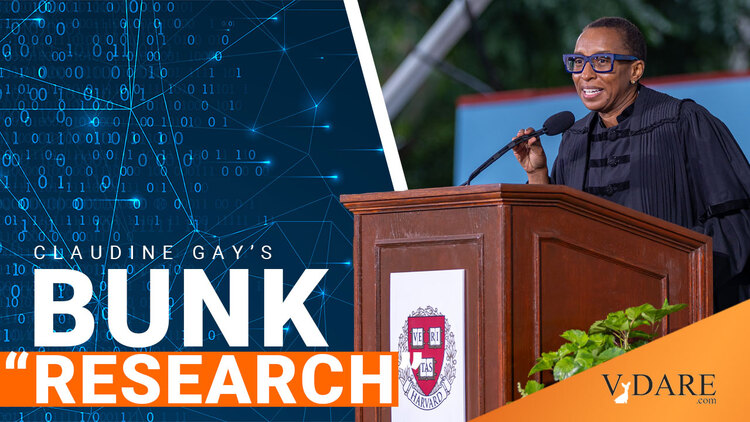
Academic Rigor, Academic Envy, And The Claudine Gay Phenomenon
01/12/2024
There’s a new report, posted January 4th in City Journal, that, even setting the plagiarism issue aside, Harvard ex-President Claudine Gay’s published research is seriously shoddy.
The report here is in the form of an interview by Christopher Rufo, whose name you probably know. The interviewee. whose name you almost certainly don’t know — I didn’t — is Jonatan Pallesen, a Danish data scientist who has a Ph.D. in statistical genomics from Aarhus University, who has served as a visiting researcher at University of California, Berkeley, and who is now a lead data scientist for Dansk Industri, the Danish trade association.
Dr Pallesen gets technical pretty quickly — correlation versus causation, ecological inference, dichotomized variables, … and so on. Executive summary: Claudine Gay’s reasoning is dubious and she has, in key cases, not made her data public for proper peer review. Dr. Pallesen also notes, as I did last week, that "her scientific output for tenure was thin."
How does she get away with it? We know, of course, but Dr. Pallesen spells it out for us anyway.
There is a high level of bias within the scientific community, with a vast majority of researchers having left-leaning political views. Research that aligns with woke claims tends to find easier acceptance. It is quite extreme when you think about the edge cases. Claudine Gay does research that is simultaneously plagiarized, p-hacked, and based on an obviously flawed approach, and gets promoted to president of Harvard. Meanwhile, non-woke white male researchers, such as Bo Winegard, do meticulous research and are fired.
Claudine Gay’s Data Problem, by Christopher F. Rufo, City Journal, January 4, 2024
This kind of squishiness touches on a long-standing tension within the academy between hard and soft sciences. Hard sciences are those like physics, chemistry, biology, engineering — sciences that are supported by rigorous mathematics.
Soft sciences on the other hand — the social and human sciences — don’t make much use of tensor calculus or Fourier transforms. Their math is mainly statistical, with much more room for manipulation and error; and even that math is being applied by persons of a not-very-mathy temperament.
My favorite science vlogger, physicist Sabine Hossenfelder, was chewing over this the other day on Twitter. Sample quote:
You may have heard of "physics envy." It’s when people in "softer" disciplines like maybe psychology or sociology try and use methods of physics that are inadequate to small datasets beset with large uncertainties. A common consequence is that correlations are read into data that’s really just noise.
Yep, "physics envy": the envy that psychologists, sociologists, and the rest of the "soft science" researchers feel because they can’t duplicate the rigor and certainty of the "hard" sciences like physics.
Dr Hossenfelder points out that envy works the other way, too. Physicists like herself think that researchers in the "soft" sciences work less hard than they do for the same academic rewards, and get away with more sloppiness. She refers to these suspicions in the heads of physicists, biologists, and other "hard" scientists as "soft science envy."
See? Academic envy works in both directions.
Hmm. There’s a lot to be said there — about climate science, for example. Is it "hard" or "soft"? This and other issues are worked over in a long comment thread to Dr. Hossenfelder’s tweet, which I'll leave interested listeners to check for yourselves.
I'll just note that as wokeness seeps into every nook and cranny of the academy, the hard sciences are getting softer. There was a very striking example of this reported at the Daily Caller, January 10th[Rice University Offers ‘Afrochemistry’ Class To Address ‘Inequities In Chemistry’].
Rice University, a prestigious institution in Texas — the one where our own Steve Sailer (pre-order his book!) did his undergraduate studies — is offering a course on "Afrochemistry," starting this semester.
The course, which runs from January 8th to April 19th "seeks to address 'inequities in chemistry and chemical education.'" End quote. Here’s another snippet from the course prospectus:
Students will apply chemical tools and analysis to understand Black life in the U.S. and students will implement African American sensibilities to analyze chemistry.
There is no final exam, so I’m not sure how students will be graded — by the darkness of their skin, perhaps.
